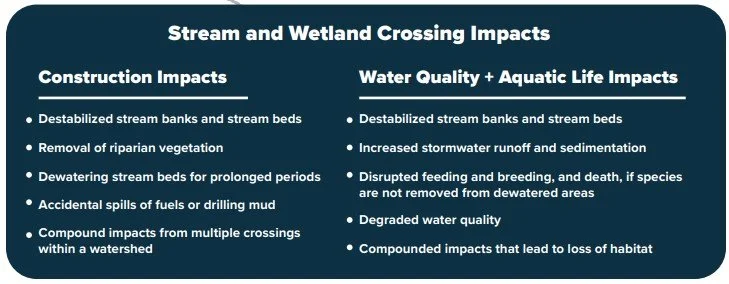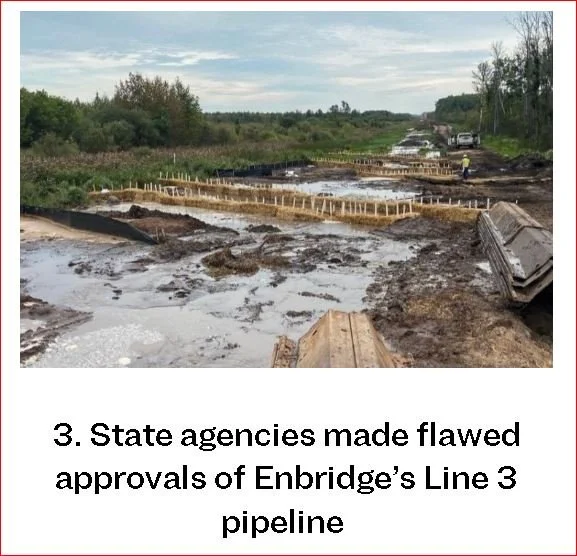Supporters & Collaborators
Flyover Partners
White Earth Reservation, Honor The Earth, RISE Coalition, MN350, and Sierra Club North Star Chapter collaboration.
On November 26-27, 2021, just weeks after Enbridge began flowing Tar Sands through their new Line 3/93 pipeline, our Flyover Partners performed a fixed-wing flyover of the entire corridor with thermal imaging rated to 0.3°C/0.25m capability.
Grant Support
Waadookawaad Amikwag would not be able to provide the water testing and scientific analysis without the generous and gracious support of the Center for Applied Environmental Science. Alongside a grant from the University of Wisconsin-Madison, providing equipment and technical support for a flurry of Summer 2023 field community science work, Waadookawaad Amikwag has been able to make extensive progress in our documentation of Enbridge Line 3/93 damage sites. We are ever grateful for these critical funding and collaborative relationship opportunities.
Healing Minnesota Stories
Scott Russell has been blogging on the Line 3 project since long before the project came to be. His collaboration with Waadookawaad Amikag in 2023 has been a boon to our ability to reach the public with our news.
In July of 2023, he reported findings from Waadookawaad Amikwag regarding what appeared to the Team to be another aquifer breach along the Line 3/93 corridor. Following his publication, the state regulatory agencies and Enbridge finally acknowledged this breach to the public.
Here are some of the blogs that might be of interest for those following our work:
Intervenors seek jail time for Enbridge execs for failure to remain ‘law abiding’, Oct. 16, 2023
The backstory on Line 3’s aquifer breaches: It’s about sheet pilings and a failed regulatory system, Aug. 9, 2023
Enbridge Line 3’s aquifer breaches: A summary, Aug. 8, 2023
Seems like Enbridge pays more for PR writers than environmental protection, July 28, 2023
We’re getting a slow drip of information on serious construction damage from Enbridge’s tar sands pipeline, July 26, 2023
Walker Brook shows we still don’t know the extent of Enbridge Line 3’s construction damage:Waadookawaad Amikwag is working to find out, March 15, 2023
Volunteers spotlight more groundwater problems apparently created during Line 3 pipeline construction, Oct. 30, 2022
Drone footage reveals more Line 3 construction damage, water protectors again seek federal intervention, Oct. 1, 2022
Line 5 related: WCMC: Call for immediate citizen action as riverbank erosion nears the Enbridge Line 5 pipeline
Downstream Strategies worked with WV Rivers Coalition to publish a report analyzing inspection reports of the Mountain Valley Pipeline stream and wetland crossings in West Virginia. The report summarizes the findings of this analysis and the environmental effects on West Virginia streams and wetlands.
When Waadookawaad Amikwag began our work in 2021, just after Enbridge’s Line 3/93 pipeline began flowing oil, CAES granted us technical assistance from Downstream Strategies in West Virginia. Early on, we found their Pipeline Impacts to Water Quality report (2019). We wondered how this technical reporting might have helped us prevent the environmental damages we now see across Northern Minnesota since Enbridge’s installation.
In November 2024, West Virginia Rivers and Downstream Strategies summarized pre-construction and post-project inspection reports for 139 stream crossings and 61 wetland crossings by Mountain Valley Pipeline. The results were disturbing. Despite meeting requirements for best management practices, post-project inspections showed significant impacts to biological conditions.
Only 6% of stream crossings showed no degradation, while 88% showed a decrease of biological conditions in the riparian buffer zone. Many crossings showed significant decreases in scores with channel conditions being most impacted, bringing concerns for erosion and sedimentation.
Wetland soils were impacted at 89% of crossings with diminished vegetation resulting at 70% of crossings. These changes reduce the ability of wetlands to slow water flow, prevent erosion, and capturing sediment and nutrients. Such hydrologic and biologic disturbances show pipeline construction is as big a concern as any oil spills to follow.
“Even when ‘enhanced’ erosion control measures are in place, this report documents the destructive nature of pipeline construction,” said Mariah Clay, Southern WV Coordinator at WV Rivers Coalition. Clay continued, “Healthy streams and wetlands are vital to the region’s biodiversity, water quality, and resilience to climate impacts. The damage documented shows an urgent need for sustained monitoring, restoration, and accountability.”
Watch the WV Rivers Webinar for a full update of the findings. And read the full report to understand the impacts to land and water.
People Not Polluters
Minnesota government should do right by its people and protect our communities and natural resources—not polluting companies.
We support the People Not Polluters website bringing awareness to the ongoing degradation of the world around us, especially in vulnerable places and impacting already vulnerable communities. Some specifics regarding Line 3 and Dewatering are shown here.
We encourage you to visit PeopleNotPolluters.com for more details on these concerns and to learn more about the many other places we need a focused attention on protecting People, not Polluters.
Learn more about the People Not Polluters work at our Take Action Page!!
Our October Webinar was a huge success! Learn more at People Not Polluters.
Others in the Movement…
Jami Gaither’s blog, Retired at 45, has been sharing on land and water defense since 2015. Her blogs detail the proceedings from proposal, through permitting, and now, documenting the aftermath of the Line 3 pipeline build. Some recent posts to consider:
A Small Group of Thoughtful, Committed Citizens 10/10/22
No Line 5 Permits for Enbridge 10/17/22
More Damages Along Enbridge's Line 3/93 Pipeline Corridor 12/2/22
Concerns of a Clearwater County Minnesota Metallurgical Engineer 12/29/22
A Bunch of Losers... Finally Get a Win 5/29/23
Waadookawaad Amikwag Continues Truth-telling about Enbridge Damages 7/31/23
Busy Week for Waadookawaad Amikwag 10/16/23
Are Minnesota Farmers Responsible for Our Ongoing Drought? 10/30/23








